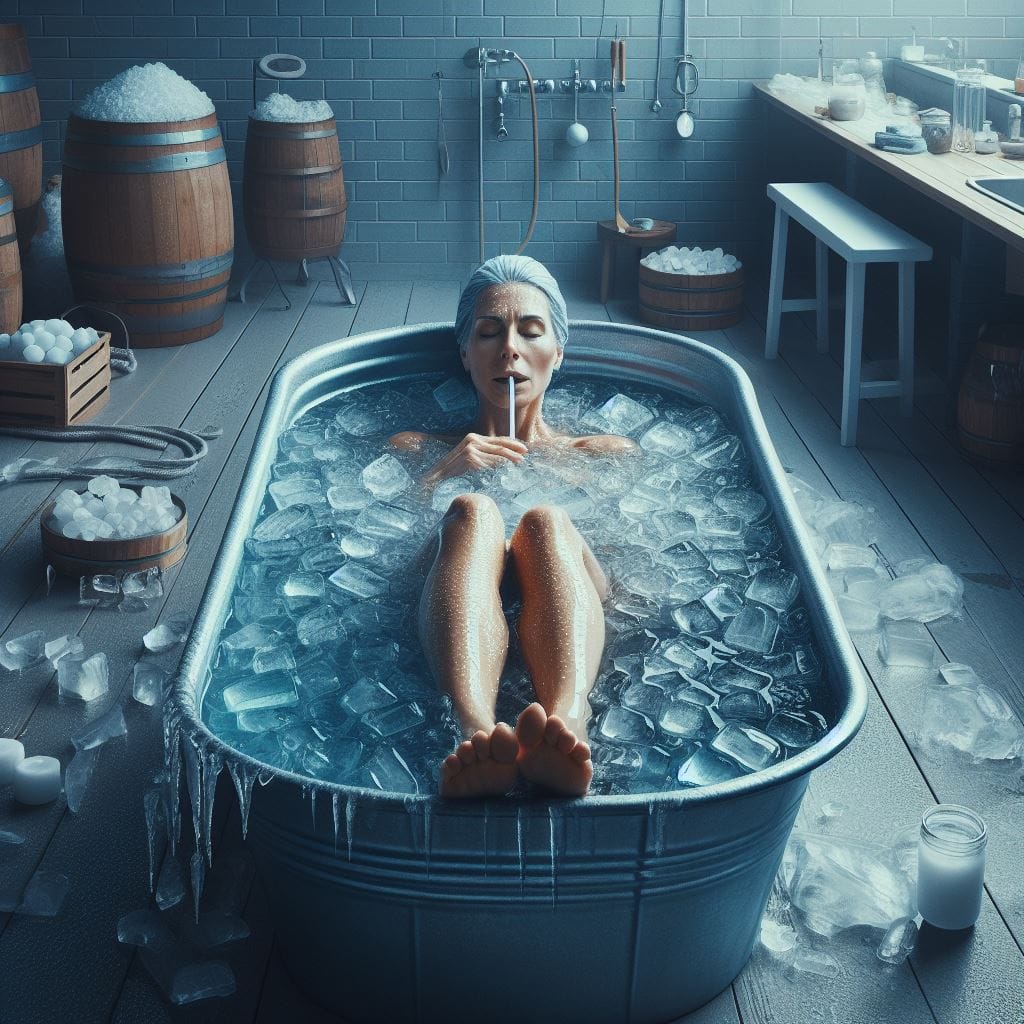
Cold • Ice baths have been a staple in wellness routines for centuries, offering a refreshing and invigorating experience. Whether you’re an athlete looking to enhance recovery or someone seeking an alternative therapeutic practice, the benefits of cold therapy are vast and backed by scientific evidence.
I. Introduction
Definition of Cold • Ice Bath
Cold • Ice baths involve immersing the body in cold water, usually with ice or ice packs, for a designated period. The practice is renowned for its therapeutic effects on muscle recovery, athletic performance, and overall well-being.
Historical Use and Origins
Dating back to ancient civilizations, cold baths were embraced for their perceived healing properties. From Greek and Roman bathhouses to traditional Eastern medicine, the roots of cold therapy run deep.
II. Benefits of Cold • Ice Baths

Muscle Recovery
Reduction of Inflammation
One of the primary benefits of cold baths is their ability to reduce inflammation. The cold constricts blood vessels, minimizing swelling and promoting a faster recovery from strenuous physical activity.
Alleviation of Muscle Soreness
Cold • Ice baths effectively alleviate muscle soreness by numbing nerve endings and decreasing muscle spasms. This makes them a go-to choice for athletes managing the aftermath of intense workouts.
Improved Athletic Performance
Engaging in regular cold • ice baths has been linked to improved athletic performance. The practice helps optimize muscle function, enabling athletes to push their limits and recover more efficiently.
Enhanced Circulation and Immune Function
Cold therapy stimulates blood circulation, which, in turn, supports immune function. Regular exposure to cold has been associated with an increased production of white blood cells, strengthening the body’s defense mechanisms.
III. How to Take a Cold • Ice Bath
Setting up the Bath
Temperature Guidelines
For optimal benefits, maintain a bath temperature between 10 to 15 degrees Celsius (50 to 59 degrees Fahrenheit). Adjust the coldness gradually to avoid shock.
Duration Recommendations
Beginners should start with shorter sessions, around 10 minutes, gradually extending to 15-20 minutes as tolerance increases.
Safety Measures
Precautions for Beginners
Those new to cold • ice baths should be cautious. Start with milder temperatures and consult with a healthcare professional if you have pre-existing health conditions.
Health Considerations
Individuals with cardiovascular issues or extreme sensitivity to cold should exercise extra caution. Consultation with a medical professional is advised.
IV. Alternatives to Traditional Ice Baths
Cryotherapy
Cryotherapy chambers offer a modern twist on traditional cold baths, exposing the body to extremely cold temperatures for short durations. This method is popular among athletes and wellness enthusiasts.
Contrast Water Therapy
Alternating between cold and warm water in a contrast bath can provide similar benefits to a continuous cold • ice bath, catering to those who find the sudden chill overwhelming.
Benefits and Drawbacks of Each
While cryotherapy and contrast water therapy offer unique advantages, they also come with their own set of considerations. It’s essential to explore these alternatives and choose the method that aligns with personal preferences and health needs.
V. Common Misconceptions about Cold • Ice Baths
Mythbusting the Risks
Dispelling common myths surrounding cold • ice baths is crucial for encouraging more individuals to explore this therapeutic practice. From concerns about hypothermia to misconceptions about immune health, separating fact from fiction is key.
Addressing Popular Concerns
By addressing concerns head-on and providing evidence-based information, readers can make informed decisions about incorporating cold therapy into their wellness routines.
VI. Personal Experiences and Testimonials
Athlete Testimonials
Numerous athletes swear by the benefits of cold • ice baths for their recovery and performance. Personal anecdotes from sports professionals can inspire readers to give cold therapy a try.
Celebrity Endorsements
Celebrities, too, have joined the cold therapy trend, sharing their positive experiences. Their endorsements add a touch of glamour to this age-old wellness practice.
VII. Scientific Perspective
Studies on Cold Therapy
Scientific studies consistently support the positive effects of cold • ice baths on muscle recovery, inflammation reduction, and overall well-being.
Expert Opinions on Efficacy
Experts in sports medicine and wellness provide insights into the efficacy of cold therapy, offering a comprehensive understanding of its physiological benefits.
VIII. DIY Cold • Ice Bath Recipes
Adding Epsom Salt for Enhanced Benefits
Elevate your cold • ice bath experience by incorporating Epsom salt. The added magnesium can further aid in muscle relaxation and recovery.
Aromatherapy Infusions
Enhance the sensory experience by adding essential oils to your cold bath. Aromatherapy can contribute to relaxation and stress relief.
IX. Cold • Ice Baths for Specific Conditions
Arthritis and Joint Pain
Exploring how cold therapy can be adapted for individuals with arthritis or joint pain provides valuable insights for those managing chronic conditions.
Post-Surgery Recovery
Cold • ice baths can play a role in post-surgery recovery, offering a natural and drug-free option for managing pain and promoting healing.
X. Incorporating Cold Therapy into Daily Routine
Morning vs. Evening Baths
Discussing the benefits of morning vs. evening cold • ice baths helps readers tailor this practice to their daily schedules and preferences.
Combining with Other Wellness Practices
Exploring synergies with other wellness practices, such as meditation or breathing exercises, can enhance the overall impact of cold therapy.
XI. Addressing Concerns about Cold Therapy and Immune Health
Separating Fact from Fiction
Clarifying misconceptions about cold therapy’s impact on the immune system ensures readers make informed decisions about incorporating this practice into their routines.
Benefits for Immune System Support
Highlighting studies that suggest a positive correlation between cold therapy and immune system support reinforces the health benefits of this practice.
XII. Environmental Impact of Cold Therapy
Water Conservation Tips
Providing tips for reducing the environmental impact of cold • ice baths ensures that readers can enjoy the benefits of this practice responsibly.
Sustainable Alternatives
Exploring eco-friendly alternatives, such as reusable ice packs or cold showers, aligns cold therapy with sustainable living practices.
XIII. Exploring Cultural Practices
Traditional Uses in Different Cultures
Discovering how cold therapy is integrated into traditional wellness practices across various cultures adds a cultural perspective to this global phenomenon.
Rituals and Beliefs
Exploring the rituals and beliefs associated with cold therapy in different cultures enhances the understanding of its significance beyond the physical benefits.
XIV. Tips for Making Cold • Ice Baths Enjoyable
Entertainment Options
Suggesting ways to make cold • ice baths more enjoyable, such as listening to music or podcasts, ensures readers look forward to incorporating this practice into their routines.
DIY Spa Atmosphere
Creating a spa-like atmosphere at home with candles, soft lighting, and calming music can transform a cold • ice bath into a luxurious self-care ritual.
XV. Conclusion
Summarizing Key Benefits and Considerations
In conclusion, the benefits of cold • ice baths are multifaceted, spanning from muscle recovery to immune system support. It’s a versatile practice that caters to various wellness needs.
Encouragement for Readers to Try Cold • Ice Baths
Encourage readers to explore cold therapy, emphasizing the adaptability of the practice to individual preferences and needs. Experimenting with different variations ensures a personalized and enjoyable experience.
Frequently Asked Questions (FAQs)
- Is it safe for everyone to take cold • ice baths?
Cold • ice baths are generally safe, but individuals with certain health conditions, such as cardiovascular issues, should consult a healthcare professional before starting.
- How often should one take cold • ice baths for optimal benefits?
The frequency of cold • ice baths depends on individual preferences and goals. Starting with one to two sessions per week and adjusting based on personal response is recommended.
- Can I use alternatives like cryotherapy instead of traditional cold • ice baths?
Yes, alternatives like cryotherapy or contrast water therapy can be effective. However, it’s essential to understand their specific benefits and drawbacks before choosing.
- Are there any age restrictions for cold • ice baths?
Cold • ice baths are generally safe for adults, but caution should be exercised with children and older individuals. Adjusting water temperature and duration is crucial for these demographics.
- Can cold therapy help with conditions like arthritis?
Cold therapy may provide relief for individuals with arthritis, but it’s advisable to consult with a healthcare professional to ensure it aligns with their treatment plan.











